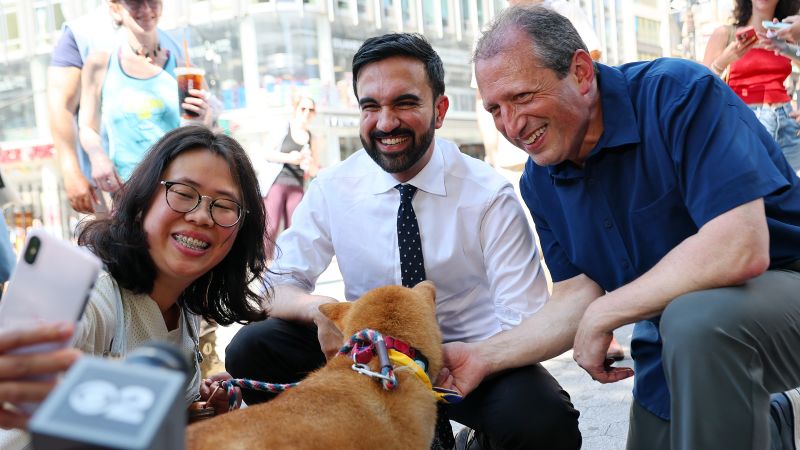New York state Assemblyman Zohran Mamdani leads the Democratic primary for mayor of New York City, but CNN projects his initial support will remain below 50%, meaning the race will be decided by ranked-choice votes.
The 33-year-old democratic socialist is well-positioned to claim a remarkable primary win. Even as a winner won’t be known for at least another week, Mamdani’s strong performance will reverberate beyond America’s largest city, catapulting both Mamdani and his policy ideas into the national spotlight.
A three-term state assemblyman who represents parts of Queens, one the most diverse areas in the nation, Mamdani vaulted from being a virtual unknown with a mix of viral videos and proposals appealing to younger progressives. His detractors have argued his limited legislative experience, progressive policies and criticisms of Israel make him too extreme for the city.
He now leads a large field that includes Andrew Cuomo, the former New York governor attempting a comeback less than four years after he resigned amid allegations of sexual harassment and mishandling of the Covid-19 pandemic. He has denied the allegations against him.
Mamdani was leading each of the city’s three largest boroughs, including in Queens where Cuomo grew up.
Besides Mamdani and Cuomo, the only candidate getting more than 5% of the vote was city Comptroller Brad Lander. While not all of Lander’s voters will go to Mamdani when their candidate is eliminated, the two had told their supporters to rank the other on their ballots.
The ultimate Democratic winner will face incumbent Mayor Eric Adams, who is running as an independent after he bypassed the primary he won four years ago, as well as Republican Curtis Sliwa and at least one of his rivals running on a separate ballot line.
The city board of elections will report additional votes (including mail ballots received since Friday) and conduct an initial ranked-choice reallocation on July 1.
While Mamdani will start the ranked-choice reallocation as the favorite, he is not a lock to get over 50% once the system fully accounts for voters’ preferences.
Each Democratic primary voter was able to select up to five candidates in order of preference. During each reallocation round, the candidate with the fewest votes is eliminated and people who ranked that candidate first will have their votes reallocated to their next-highest choice still in the running.
That process will continue round by round until only two candidates are left. The candidate with the most votes wins. The board of elections will conduct reallocation once a week until all ballots are reported.
Someone could clear 50% before every round is finished, allowing for a winner to be projected. High-quality pre-election polling that simulated a reallocation ultimately found Cuomo and not Mamdani landing above 50% in the end.
Mamdani listed several other progressives he would rank on his ballot while Cuomo said Tuesday that he voted just for himself.
Prominent progressive leaders in the city, such as Rep. Alexandria Ocasio-Cortez, pushed their supporters to not rank Cuomo on their ballots to limit his gains through reallocation. Ocasio-Cortez endorsed Mamdani as her top choice.
Cuomo, though, came to the campaign far more widely known and with broad bases of support among more moderate Democrats, Black voters and older voters, and is banking that more of those voters will have ranked him ahead of Mamdani.
In the last mayoral election in 2021, the first time using ranked-choice voting, Adams remained in first place the entire time—though another candidate ultimately came within 7,000 votes of overtaking him once all the rankings were sorted.
If Mamdani remains ahead, it would be a stunning result for a 33-year-old assemblyman with less than five years in government who just months ago was running a fledgling campaign relying on creative online videos. It would also be the biggest win to date for the Democratic Socialists of America: Mamdani is a proud DSA member and geared his volunteer-driven campaign around talking up the affordability crisis in New York through moves that include proposals to freeze rents, make buses free and open government-owned grocery stores, all paid for by a massive tax hike on the rich he will need to convince the state government to pass.
Many Democrats in New York are adamantly opposed to Mamdani, both due to those socialist proposals and anger over his positions related to antisemitism and support for Israel. Mamdani refused to say he believed Israel had the right to exist as a Jewish state or to condemn the phrase “globalize the intifada,” referencing an Arabic term used by Palestinians to describe their uprising against Israel. Cuomo repeatedly accused Mamdani of fueling antisemitic hate, a charge Mamdani denied.
Mamdani will have his own work to do on the left too, including other candidates and their supporters who may like him personally but oppose his socialist politics.
And he will have to convince skeptics that he is the right manager for a city facing compounding crises of affordability, crime rates, overall dysfunction, along with a massive influx of migrants that has complicated all three, all while being able to stand up to Trump.
Plus, Mamdani could have a rematch against Cuomo ahead, with the former governor potentially running on his own ballot line, making the case that he is the person speaking to the mainstream of where Democrats and New Yorkers overall are as they grapple with the crises facing the city and the incoming pressure from Trump.
